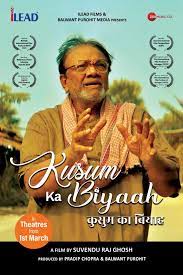
Kusum Ka Biyaah: A Bridge That Divides
Jharkhand was separated from the state of Bihar many years ago. Perhaps some people in any of the states and governments are yet to come to terms with the partition. There seem to be irreconcilable differences between them. Against this background comes a small independent film, Kusum Ka Biyaah (Kusum's Marriage), which is set in the border areas of the two states and deals with the marriage of a graduate girl named Kusum, from Bihar, to a mine worker. of Jharkhand coal, called Sunil. Neither the title nor this brief synopsis prepares you for what you are about to see. It's based on a true story, which gives it a natural authenticity, but the creators must be commended for sticking to the basics and delivering a film that's eminently watchable.
Dashrath Soren and his wife are retired and live together, having lost their son when they were young. They have a daughter, Kusum, who is educated up to graduation level. Eager to marry her soon, they resort to the help of a pandit, who suggests the date of the 21st.street March. A Munda family is found, from whom he does not demand any dowry. Both parties are happy with the relationship, although Dashrath's wife worries that the time is too short to make all the arrangements. But we are in 2020 and Covid has arrived in India. The Prime Minister announces that there will be a “popular curfew” on the 21ststreet March. This poses an obstacle to marriage plans. Dashrath and his wife suggest that the bride and groom's family bring forward the date a couple of days and celebrate a no-frills wedding, since the decorations and rituals will not be possible on the 21st.street. The family does not agree.

So, the wedding takes place on the 21st.street March, at the bride's house, and the next morning, the groom and the bridal party (an investigator) departure towards Jharkhand. But the police are not allowing them to cross the border, into Bihar, because all movement between states has been restricted due to Covid 19. They all have to return to Dashrath's house. But how long can this continue? The curfew will be in effect for at least 21 days. Dashrath approaches the Sarpanch (head/Mukhiya) of the village and after much persuasion, he agrees to approach the district magistrate's (DM) office to grant this. procession permission to cross the border. The DM obliges. Elated, everyone runs towards the bamboo bridge over the Damodar River that separates the two states. Much to their relief, the police let them through thanks to the DM's permission, but their misfortune has only just begun. Police on the Jharkhand side stop them because they do not have documents allowing them to enter their home state. They also cannot return to Dashrath's house, because the permit they have allows them to leave, but not enter. Now they will have to remain on the bridge indefinitely, with no food, water or toilets in sight.
A round of applause for writers Vikash Dubey and Sandip Dubey. Translating a true story to the big screen is never an easy task and they have done it with aplomb. The dialogue is rooted in the ground and is never overused. There is no attempt to insert trivial situations or turn any character into a hero or a martyr. Almost everyone gets the same exposition and even the cameos seem complete in themselves. The inherent goodness of human beings, a quality that is increasingly rare, emerges as if it were innate in good men and women, who carry it in their hearts. One scene, just one, has some humor: when a customer wants to deposit a huge sum of money in his bank because he fears that when the prime minister addresses the nation that same day, he might announce another demonetisation of certain currencies, as he had done some years before. There are only three scenes that generate discord. First of all, the beginning and all the author, award and audience is a sheet of Anamika (1973), in which this writer acted. Secondly, the director/owner's visit to the coal mine seems unnaturally portrayed, compared to the rest of the film. And finally, the scene(s) between the mine supervisor and his wife, in his house. This is where the director should come in.

Shooting with great economy of time and space, Suvendu Raj Ghosh has done a very good job. Of course, he could have done better filming the three scenes above. All the characters play their roles and melodrama is avoided. Often, important information is conveyed in a single line or a single word. Like when Kusum tells her future husband that she wants to continue studying after marriage, and when another woman asks her, on the bridge, how much she has studied, she answers: “Graduated.” The TV crews are portrayed strangely, but who knows, the TV crews in that region might be like that. It is clear that the story of Kusum Ka Biyaah is symbolic, and while we empathize with the characters stranded on the bridge, we must also reflect on the booby traps of bureaucracy and petty politics. Interestingly, a police officer, after declaring that he can't do anything within the system, agrees to help the hapless inhabitants of the bridge from outside the system. But I didn't see him doing anything to promote his position.
Veteran Mushtaq Khan plays the writer who will be honored, in March 2024, for his book on the March 2020 incident. He downplays it and is a good piece of casting. But I felt that his voice was dubbed. Ask yourself why. Pradeep Chopra as Dashrath Soren has a good role, except that he sometimes sounds a little younger than he looks. The film introduces two new faces: Lovekansh Garg as Sunil and Sujana Darjee as Kusum. Both seem like characters from life. I couldn't identify Tanmoy Bhattacharjee, Ayush Mukherjee, Moumita Paul and Arnab Santikary, who are among the main cast. But whatever role they played, they fit in with the rest of the cast. Two other characters have names: Raja Sarkar as Prashant Munda and Suhani Biswas as Rewati Munda. You'll be hard-pressed to find fault with any of them.
Congratulations also to Saurav Banerjee, Director of Photography, Bhanu Pratap Singh, Music Director and Raj Singh Sidhu, Editor. The title of the film could have been better, because Kusum's marriage is not the focus of the film. It is used as a launching pad to highlight social evils and the triumph of the human over the inhuman. Bridges are meant to bring people together, not to divide and pit one side against the other. Kusum Ka Biyaah is a carefully packaged 100 minutes of good cinema. It's not entertaining, but many classics are anything but entertaining.
This review came very late because I missed the preview and had to watch it on Vimeo. I am happy to have done it. Look at it. Where you can.
Classification: ***









